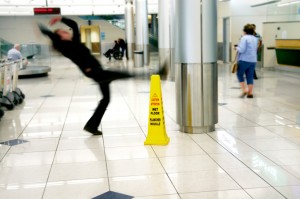 The mere happening of an accident is not proof of negligence. McCombe v. Public Service Railway Co. 95 N.J.L. 187; Donus v. Public Service Railway Co., 102 N.J.L. 644. “Negligence is a fact which must be proved; it will not be presumed.” Id.
The mere happening of an accident is not proof of negligence. McCombe v. Public Service Railway Co. 95 N.J.L. 187; Donus v. Public Service Railway Co., 102 N.J.L. 644. “Negligence is a fact which must be proved; it will not be presumed.” Id.
A business owner has a duty to provide a safe environment for its invitees. Nisivoccia v. Glass Gardens, Inc., 175 N.J. 559, 563 (2003). This duty of care “requires a business owner to discover and eliminate dangerous conditions, to maintain the premises in safe condition, and to avoid creating conditions that would render the premises unsafe.” Id. A business is generally not liable for injuries caused by dangerous conditions of which they were not aware. Brown v. Racquet Club of Bricktown, 95 N.J. 280, 291 (1984). Thus, ordinarily the burden is upon the plaintiff to prove “that the defendant had actual or constructive knowledge of the dangerous condition that caused the accident.” Nisivoccia, 175 N.J. at 563. Constructive knowledge will be found “if the condition had existed for such a length of time that [the business owner] should have known of its presence.” Bozza v. Vornado, Inc., 42 N.J. 355, 359 (1964)).
In fact, the mere existence of a dangerous condition does not, in and of itself, establish constructive notice of it. Sims v. City of Newark, 244 N.J. Super. 32, 42, 581 A.2d 524 (App. Div. 1990). “A proprietor generally is not liable for injuries caused by defects of which he had no actual or implied knowledge or notice, and no reasonable opportunity to discover.” Brown v. Racquet Club of Bricktown, 95 N.J. 280, 291, 471 A.2d 25 (1984).
When the very nature of a business’s operation creates the hazard, however, the “mode-of-operation rule” creates an inference of negligence and “the burden shifts to the defendant to negate the inference by submitting evidence of due care.'” Nisivoccia 175 N.J. at 564 (quoting Bozza, 42 N.J. at 360). This inference relieves the plaintiff of proving that the defendant had actual or constructive notice of the dangerous condition and instead requires the defendant to show it did “all that a reasonably prudent man would do in light of the risk of injury [the mode of operation] entailed.” Wollerman v. Grand Union Stores, Inc., 47 N.J. 426, 429. If the defendant provides no explanation, the facts presented by the plaintiff should allow a jury to find “from the condition of the premises and the nature of the business that [the defendant] did not exercise due care in operating the [business], and that said negligent operation was the proximate cause of [the plaintiff’s] injuries.” Bozza, supra, 42 N.J. at 359.
In the cases of Nisivoccia and Wollerman, the New Jersey Supreme Court found that self-service operations that made loose fresh produce available in bins for the customer’s selection made spillage (of a grape and a string bean respectively) inevitable.
Here at Ginarte, Gonzaelez & Winograd, LLP, we provide high-caliber representation to New York / New Jersey personal injury victims and their families. Contact our office at 1 (888) GINARTE for free consultation and we will make sure your rights are not lost. You can also use our online contact form.
